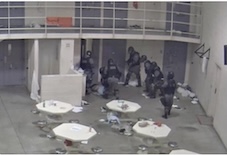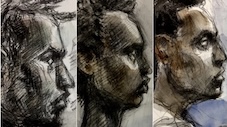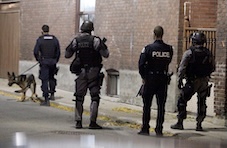
Reported Cases
Every case has it’s own story. Some cases are reported either by the media or as legal precedents. Criminal cases are reported by the media because of their impact on the community and the public’s right to know. Transparency is one of the founding pillars of our justice system and our democracy. Criminal cases are also reported as judicial precedents that can be applied to future decisions thereby guiding the evolution of the law. Deniz has represented hundreds of clients in all sorts of criminal cases. The vast majority of these cases are unreported. Below are some notable reported decisions.

R. v. L.B.
Sentencing hearing on charge of second degree murder. Starting point for sentencing of this charge is to determine if the parole ineligibility period should be increased from the minimum period of 10 years.
R. v. A.B.
Application to exclude evidence based on racial profiling. Case involved “driving while black” police stop. Racial profiling can be proven where the circumstances relating to the arrest correspond to the phenomenon of racial profiling.

R. v. I.C.
Client charged as part of Project Skyfall involving allegations of GTA home invasions. Client’s charges were withdrawn. No criminal record.

R. v. E.V.
Client charged with second degree murder resolved to lesser charge of manslaughter. This was one of the first cases detailing and exposing the Maplehurst 2023 ICIT incident.

R. v. T.D.
Client charged with first degree murder found not criminally responsible. A tragic case involving mental illness.
College of Early Childhood Educators v. J.K.
Client was acquitted of all allegations after a contested disciplinary hearing which lasted 10 days. This is rare case where an ECE was acquitted of all allegations made against them.

R. v. D.P.
Client charged with importing firearms from the United States. Over 90% of illegal handguns in Ontario are traced to the United States.

R. v. M.H.
Client charged with significant trafficking and firearm charges. All charges dropped after filing motion to stay charges for unreasonable delay. Justice delayed is justice denied. No criminal record.
R. v. K.M.
Client found not guilty after trial on charges of possession of a firearm. Trial judge found that there were no reasonable grounds for detention and arrest and that these Charter violations were serious enough to warrant exclusion of evidence.

R. v. D.K.
Client arrested by RCMP and charged with terrorism peace bond released after bail hearing. This process requires a person to follow conditions where there are reasonable grounds.
R. v. J.C.
Client acquitted after trial on charges of possession for the purpose of trafficking heroin. “Possession” was the main issue at trial. Trial judge found that there were other reasonable inferences of possession.
R. v. A.N.
Client acquitted after trial on charges involving two firearms, fentanyl, and ecstasy. Successful application to challenge the warrant (a.k.a. Garofoli application) finding that the warrant was invalid and excluding all the evidence.

R. v. T.C.
Client charged with second degree murder. Trial involved several applications including: prior disreputable conduct; mistrial application; proceeding in person or remotely during Covid-19 shutdown; application to re-open evidentiary ruling; application for a directed verdict; and sentencing hearing.
R. v. N.N.
Bail review during Covid-19 pandemic considering factors relating to the heightened health risks at the jails.
R. v. F.O.
Client charged with firearm charges found not guilty after trial. The evidence was excluded because police engaged in unlawful detention and search of the car my client was driving.

R. v. S.M.
Client charged with possession of firearm during celebration of Toronto Raptors’ NBA Championship. He was arrested at the Eaton Centre.
R. v. M.H.
Application to stay the charges for excessive use of force by Durham Regional Police. Police can use force to effect a lawful arrest but not greater force than is objectively necessary in the circumstances.
R. v. P.C.
Client found not guilty of attempted murder after trial. The main witness was found to be unsavoury and unreliable. The trial judge agreed that the evidence was highly problematic.

R. v. N.N.
Client charged with armed robbery of jewelry store in Markville Mall.
R. v. M.P.
Application to strike a guilty plea because it was not informed. For a plea to be informed there must be awareness of the nature of the allegations, the effect of the plea, and the consequences of the plea.
The United States of America v. R.N.
Extradition hearing to the U.S. for fraud related charges. The legal test is whether there is sufficient evidence that would support committal on the Canadian version of the offence.
R. v. C.T.
Application to replace undertaking with a recognizance because the terms of the undertaking were not reasonable and unnecessary. Case involved highly publicized incident. The application was granted.

R. v. R.N.
Client charged in high profile take down involving $20 million dollars in drugs, firearms, and cash. The matter resolved through a plea deal.

R. v. L.G.
Client charged with robbery involving threats of explosives.

R. v. C.G.
Client charged with second degree murder. He was acquitted after trial before a jury.
R. v. A.R.
Application for state funding of counsel. The application should be granted where there is a probability of imprisonment and the case is sufficiently complex to require counsel.

R. v. A.O.
Preliminary hearing on charges of importing heroin. There must be sufficient evidence for committal to trial. The legal test for sufficiency is whether there is any evidence upon which a reasonable jury, properly instructed, could return a guilty verdict.
R. v. J.D.
One of the major cases relied on at bail hearings across Ontario. Client facing charges of attempted murder was released on bail. The decision stands for the principle that the strength of the release plan is relevant in considering release. Bail is not a stark choice between unconditional release on one hand, and detention on the other.
R. v. A.G.
Charter motion challenging the validity of a search warrant a.k.a. Garofoli Application. Where a warrant relies on a tip from an informant the tip must be compelling, credible , and corroborated.
R. v. S.J.
Client pleaded guilty to break and enter into a dwelling. Sentencing principles of denunciation and deterrence were considered along with rehabilitation and the principle of parity which holds that similar offences with similar circumstances should receive similar sentences.
R. v. C.L.
Client was acquitted after trial on a charge of attempted robbery. After a search for evidence of an intent to rob the drug store, the trial judge was left with a reasonable doubt that the acts done by the accused supplied the necessary intent for this inchoate offence.

R. v. E.C.
Client charged with double homicide: two counts of first degree murder. A high profile tragic case raising issues of mental illness and infanticide.
R. v. B.B.
Client was acquitted after trial on charges of possession of a firearm. The expert at the Centre of Forensic Sciences could not fire the gun without fixing the firing pin and repairing the mainspring located in the handle of the gun. The gun was not sufficiently adaptable to meet the definition of a firearm because the parts were not readily available outside of the Centre’s Reference Collection.
Re W
Hearing before the consent and capacity board to determine capacity to consent to treatment of anti-psychotic drugs and side-effects. The issue was whether the person can appreciate the reasonably foreseeable consequences of a decision to refuse treatment.
R. v. S.W.
Client was charged with Criminal Harassment in case involving witnesses from California over the course of a 5-day trial. The main issue at trial the reasonableness of the complainant’s fear which is an essential element for the offence of Criminal Harassment.
